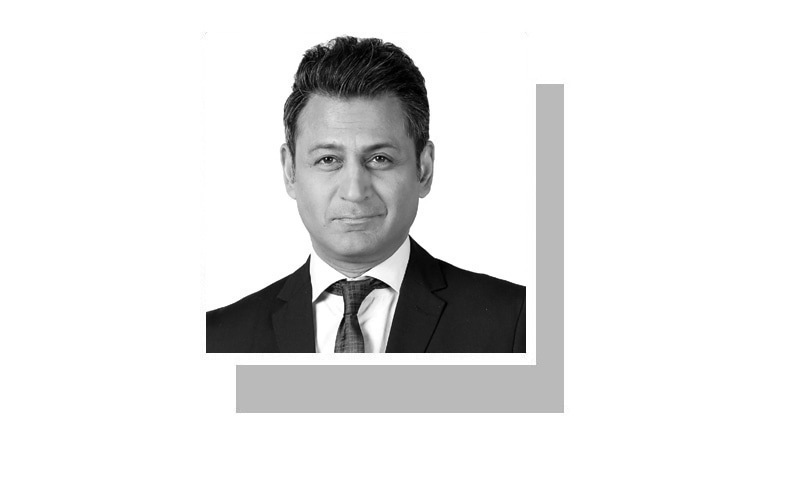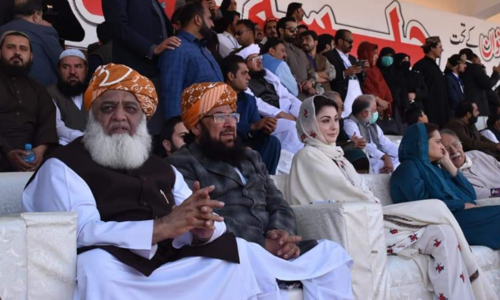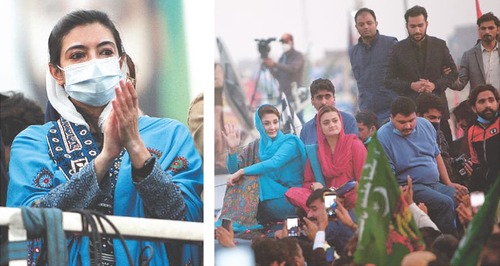WELL, that escalated fast.
The Pakistan Democratic Movement (PDM) may be in the process of fast-tracking its campaign to oust Prime Minister Imran Khan. The end game, from its perspective, may come sooner than planned. Does this mean the opposition is on the verge of resigning from the assemblies?
Well-placed sources within PDM say the issue is under serious discussion. The Lahore jalsa is scheduled for Dec 13 and the opposition parties are throwing all resources and effort into it. They see this jalsa as the apex of their campaign that started with the Gujranwala jalsa on Oct 16. It is on hitting this crescendo that they want to launch their final phase that aims to de-seat the prime minister. This phase entails two steps: a long march to Islamabad followed by resignations from all the assemblies. PDM leaders calculate this would lead to a situation that will require the holding of fresh elections. There is no way, they say, the government can get away with having by-elections on such a large number of seats. PDM parties will do whatever it takes to ensure this.
So why talk of resignations at this early stage? As it turns out, there is fresh logic. It may have emanated from inside a tent.
Why talk of resignations at this early stage? As it turns out, there is fresh logic.
The tent fluttered in the cool sunny Lahore morning this last Sunday of November. Heaters were not out yet, but Shehbaz Sharif and Hamza Shehbaz were. On parole for the demise of Mian Nawaz and Shehbaz’s mother, they were receiving condolences at the Raiwind estate along with Maryam Nawaz. It was a sombre atmosphere — as befitted the occasion — under the large tent put up to provide shade for the continuous stream of people trickling in. The MQM delegation walked in and sat beside Shehbaz Sharif for fateha. No embraces, no handshakes. Covid-19 has ruptured our cultural milieu. Soon the ANP delegation was ushered in. Politics mixed uneasily with grief.
The Multan jalsa was scheduled for the next day, but thoughts of the planners were already on Lahore. More importantly, they were on what comes after Lahore. Here there was a complication.
This complication may have a deep bearing on a decision — if it is indeed taken — to fast-track events. The second wave of Covid-19 is flaming its way across major urban centres of the country. The positivity rate — which had gone down to less than two per cent by August — is climbing beyond 8pc and shows no sign of slowing down. The last few weeks have witnessed an intense bout of corona politics between the government and the opposition in a desperate bid to pin the blame on the other. But PDM leaders realise that public opinion may turn adverse if their campaign is seen fuelling the spread of the infection.
It’s a tough call in a tough spot. Which is why there has been an intense debate within the opposition camp about how to recalibrate its campaign in the context of the second Covid-19 wave. Central to this debate is how to shape events in the wake of the Lahore jalsa without losing the momentum that is once again building up after the long break for the Gilgit-Baltistan elections. If PDM halts its campaign and waits for the Covid-19 situation to improve, it risks losing steam just when it is charged and pumped to go for the jugular. If it escalates the campaign and aims for a January long march to Islamabad, it may run into an infection peaking to June levels, and perhaps even beyond.
These tough choices are blending into tougher ones. The tougher ones are a by-product of an earlier debate that now appears to have simmered down to quasi-nothingness. The Nawaz narrative has prevailed upon his brother’s — for now — and therefore the real tough decisions at this stage lie interspersed inside the Nawaz narrative. Or in other words: not whether to fight, but how to.
The threat of a fight is however always a preferable option than the fight itself. If PDM can find greater space for its demands before the first proverbial bullet is fired, there could be a way out. So far, both sides have held on to their maximalist positions. If PDM was looking for a dialogue with the establishment, no such thing has happened. Some indirect contacts and messages between them yes, but nothing substantive according to PDM leaders. Maximalist positions appear unbridgeable, which is exactly why negotiations take place in the first place. But the place where PDM — and especially PML-N — finds itself today is nowhere near any such negotiations.
Hence the incentive to escalate.
This escalation cannot wait for Covid-19 to peak. PDM is struggling to find a way around the infection without diluting its narrative in the court of public opinion. If the alliance cannot then bypass the infection, would it be better to pre-empt it? It is a bit late for such pre-emption — Covid-19 swirling fast and furious — but when waiting is a non-option, rushing becomes the only one. The Lahore jalsa is roughly a week away.
This is one week to decide if the resignations option should be made to jump the queue. It is also a week for the PDM to start dropping heavy hints that the end game is nigh; that if any last attempts at some dialogue have to happen, now is the time; and if any de-escalation is desired it should unfold before the Rubicon is crossed.
What will mark the crossing of this Rubicon? Some say the start of the long march, others say the announcement of resignations, while some others believe the Rubicon will keep inching forward with the pace of events because, after all, no one really wants to cross it. Escalation does not make all options shrink — only the better ones. Time is fast approaching when events may start to generate their own outcomes, fuelled by their own momentum and powered by their own impulsive logic.
Then, no one wins.
The writer is Dawn’s resident editor in Islamabad.
Twitter: @fahdhusain
Published in Dawn, December 5th, 2020















































